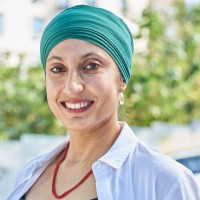
Community Health Partner
Manmeet Kaur ’12 was first struck by the power of peer support when she was working with community health programs in India and Africa. While collaborating with the Mamelani Projects in Cape Town, Kaur saw that community health workers had more of an influence on patients than clinicians. “Seeing how people hired locally could affect their neighbors’ health, and seeing the family-like relationships being formed, was incredible,” Kaur says.
Such experiences inspired her to start City Health Works, a nonprofit that helps people in East Harlem better manage their chronic illnesses — diabetes, heart disease, asthma, and depression. The program pairs clients with peer health coaches who provide motivation and education about practical ways to improve one's diet, be more active, and adhere to treatment plans.
After creating the business plan at Columbia and receiving $25,000 from Russ Carson ’67, plus $170,000 from other individual donors, Kaur secured $1.2 million from the Robin Hood Foundation and the Robert Wood Johnson Foundation, as well as a contract with the Mount Sinai Medical Center, to launch an 18-month pilot program last September. She decided to focus on East Harlem, the neighborhood with the highest rate of diet-related diseases in New York City. Working closely with community health clinics and Mount Sinai, Kaur hopes to reach 500 patients during the pilot program — and to expand City Health Works to other communities in the future.
Power of Positivity
Kaur says that scaring people to help them manage diet-related diseases — “for instance, saying ‘Cut down on salt or else!’” — doesn’t work. Instead, it’s crucial to meet people where they’re at and develop practical, realistic guidelines that are easy to follow on a daily basis. “Some of our health coaches have diabetes themselves,” she says. “Others have lost family members or struggle with it very closely in their families. So they really understand what that person is going through and can help guide them to achieve more sustainable behavior change.”
Hometown Help
Born in Queens, Kaur now lives near Central Park and jogs there every morning with her toddler son. “There’s a lot of chaos in the city and in my own life — managing both a small child and a new business — but I start every day looking at the beautiful park with him and taking a moment to reflect on my day,” she says.
Kaur has already received recognition for her work — she received the 2014 Alumni Innovator award from the School’s Tamer Center for Social Enterprise at their annual reception in February. But the biggest reward for Kaur is helping people in her hometown. “If you can empower people to take clear control of their own lives and health, you can see the most inspiring, transformative change.”
This article originally appeared in Ideas & Insights.